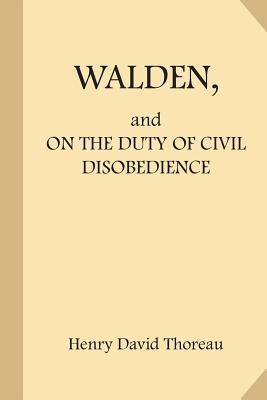
- We will send in 10–14 business days.
- Author: Henry David Thoreau
- Publisher: CreateSpace Independent Publishing Platform
- Year: 2017
- Pages: 196
- ISBN-10: 1547272953
- ISBN-13: 9781547272952
- Format: 15.2 x 22.9 x 1.1 cm, minkšti viršeliai
- Language: English
- SAVE -10% with code: EXTRA
Walden, and on the Duty of Civil Disobedience (e-book) (used book) | bookbook.eu
Reviews
Description
Originally published in 1854, Walden details Thoreau's experiences over the course of two years, two months, and two days in a cabin he built near Walden Pond, amidst woodland owned by his friend and mentor Ralph Waldo Emerson, near Concord, Massachusetts. Thoreau used this time to write his first book, A Week on the Concord and Merrimack Rivers. The experience later inspired Walden, in which Thoreau compresses the time into a single calendar year and uses passages of four seasons to symbolize human development.
While living in solitude in a cabin on Walden Pond in Concord, Massachusetts, Henry David Thoreau wrote his most famous work, Walden, a paean to the idea that it is foolish to spend a lifetime seeking material wealth. In his words, "I went to the woods because I wished to live deliberately, to front only the essential facts of life, and see if I could not learn what it had to teach, and not, when I came to die, discover that I had not lived."Thoreau's love of nature and his advocacy of a simple life have had a large influence on modern conservation and environmentalist movements.
-Library of Congress
- Author: Henry David Thoreau
- Publisher: CreateSpace Independent Publishing Platform
- Year: 2017
- Pages: 196
- ISBN-10: 1547272953
- ISBN-13: 9781547272952
- Format: 15.2 x 22.9 x 1.1 cm, minkšti viršeliai
- Language: English English
Originally published in 1854, Walden details Thoreau's experiences over the course of two years, two months, and two days in a cabin he built near Walden Pond, amidst woodland owned by his friend and mentor Ralph Waldo Emerson, near Concord, Massachusetts. Thoreau used this time to write his first book, A Week on the Concord and Merrimack Rivers. The experience later inspired Walden, in which Thoreau compresses the time into a single calendar year and uses passages of four seasons to symbolize human development.
While living in solitude in a cabin on Walden Pond in Concord, Massachusetts, Henry David Thoreau wrote his most famous work, Walden, a paean to the idea that it is foolish to spend a lifetime seeking material wealth. In his words, "I went to the woods because I wished to live deliberately, to front only the essential facts of life, and see if I could not learn what it had to teach, and not, when I came to die, discover that I had not lived."Thoreau's love of nature and his advocacy of a simple life have had a large influence on modern conservation and environmentalist movements.
-Library of Congress


Reviews